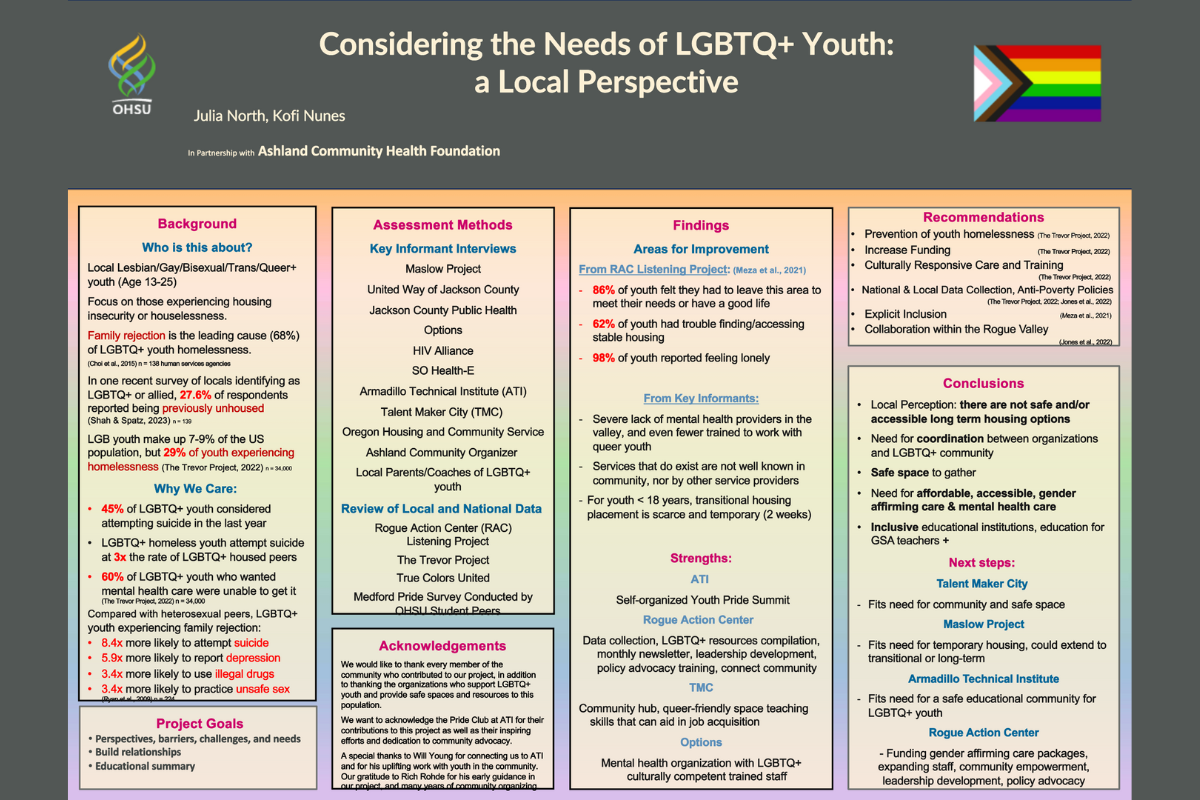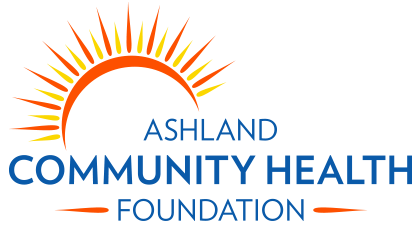
Exploring the needs of marginalized youth in the Rogue Valley and strategies for better outcomes
Since 2022, ACHF has partnered with Oregon Health & Science University (OHSU Ashland) nursing students to look at the state of health care in Ashland, Talent, and Phoenix. This year’s project focused on housing instability among LGBTQIA+ youth (ages 13 – 25) and related barriers to health services and resources.
OHSU Ashland nursing students, Julia North and Kofi Nunes, along with their advisor, Associate Professor of Clinical Nursing, Dr. Heather Voss, utilized literature review, survey results from The Trevor Project (2022) and the Rogue Action Center (RAC) Listening Project (Meza et al., 2021), as well as key informant interviews with numerous individuals and organizations to determine the challenges and needs of LGBTQIA+ youth in our area.
Through their research, Julia and Kofi discovered that LGBTQIA+ youth make up 29% of youth experiencing homelessness in the US, despite representing only 7 – 9 % of the population (The Trevor Project, 2022). In a recent local survey of people identifying as LBGTQIA+, 27.6% of respondents reported that they have been unhoused (Shah & Spatz, 2023). And, sadly, the leading cause of LGBTQIA+ homelessness is family rejection, which accounts for 68% (Choi et al., 2015).
Compared to heterosexual peers, LGBTQIA+ youth who experience family rejection are:
- 8.4 times more likely to attempt suicide,
- 5.9 times more likely to report depression,
- 3.4 times more likely to use illegal drugs,
- 3.4 times more likely to practice unsafe sex (Ryan et al., 2009).
Review of data from the RAC Listening Project revealed that 98% of LGBTQIA+ youth in the Rogue Valley reported feeling lonely. Sixty-two percent of respondents had trouble finding stable housing, and 86% believe they need to leave the area to meet their needs or have a good life.
Julia and Kofi conducted interviews with parents and coaches of LGBTQIA+ youth, the Maslow Project, United Way of Jackson County, SO Health-E, Armadillo Technical Institute (ATI), Oregon Housing and Community Service, and others to discuss existing local resources and gaps in services. Some organizations are supporting LGBTQIA+ youth through events, data collection, resource listings, queer-friendly spaces, and culturally-competent staff. However, informants brought attention to pervasive problems with availability and access, such as:
- Severe lack of mental health providers in the area and fewer who are trained to work with LGBTQIA+ youth,
- Existing services and resources are not well known in the community or by other service providers,
- Transitional housing placement for youth under 18 is scarce and temporary (2 weeks maximum)
Based on their findings, Julia and Kofi developed recommendations to positively impact the health and well-being of LGBTQIA+ youth in the community. Strategies to address housing and health disparities include education and awareness to prevent youth homelessness, increases in funding for transitional and long-term housing, culturally-responsive care training for providers and allies, explicit inclusion and safe spaces in schools and the community, and formal coordination between organizations and the LGBTQIA+ community.

We are so grateful to Julia, Kofi, and Heather for their expertise and passion for this project and for contributing to our vision of health for all. If you would like to find out how you can support the health and well-being of LGBTQIA+ youth, ACHF would love to hear from you.




